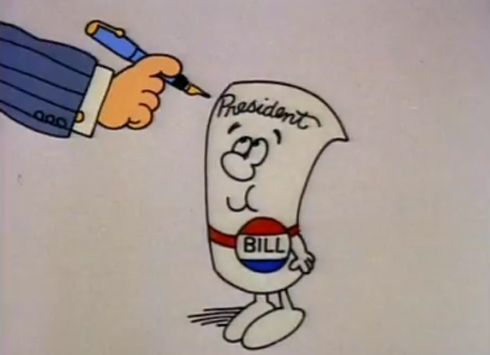The President’s Robotic Arm

There is an iconic, three minute segment of Schoolhouse Rock which teaches kids (and, we bet, grown ups) an important part of American civics: how a bill becomes a law. As the video instructs, after a favorable vote in both houses of Congress, the bill goes off the White House, waiting for the President to sign it into law. (The President can also simply wait on the bill and do nothing; so long as Congress is in session, after ten days, the bill will become a law even without his signature. If Congress isn’t in session, the unsigned bill is considered “pocket vetoed.”)
By the time a bill reaches the President — if it reaches the President, that is — and he decides to sign it, he often does so in ceremonial fashion. One tradition is to use a series of pens in the ceremony such that honorees can be given the writing utensils as a gift. But earlier this year, President Obama signed an extension to the US PATRIOT Act and did so in an entirely novel way: remotely, with an autopen.
An autopen is a machine used to automate the signing of a document. It replicates the person’s signature, allowing a person to quasi-sign a large volume of documents via automation. (If you’ve ever received a check from a large institution, chances are, the signature was made by an autopen.) It was first used by Harry S Truman to sign correspondence, but never to sign a bill into law — until President Obama did.
It is unlikely that the decision to use an autopen has any legal signficance. The U.S. Department of Justice put together a memorandum in 2005 — under then-President George W. Bush — concluding that while the president may not delegate the decision whether to sign a bill into law, he can in fact delegate the actual act of signing. (Bush never did so, autopen or otherwise.)
Before this recent autopen use, presidents traditionally — since, again, Truman — have had bills couriered to them. President Obama had intended to do the same; he had a courier waiting in Washington, ready to deliver the final bill once the Senate agreed to its terms. However, the Senate did not come to an agreement until 15 minutes before the PATRIOT Act’s provisions were to lapse, not providing the President with enough time to receive the bill by courier. He instead directed that an autopen, located in Washington, D.C., be used to endorse the bill.
Bonus fact: I’m Just a Bill (the title of the above-mentioned Schoolhouse Rock segment) came out in 1976. Twenty years later, the Simpsons spoofed the segment with “I’m an Amendment to Be” (seen here). In both segments, the bill/amendment-to-be were voiced by the same man — Jack Sheldon.
From the Archives: The President’s Pants: More funny than serious.
Related: Schoolhouse Rock 30th anniversary DVD collection. $13.99 and five stars, with a bullet — the two-disc set has over 650 reviews.
